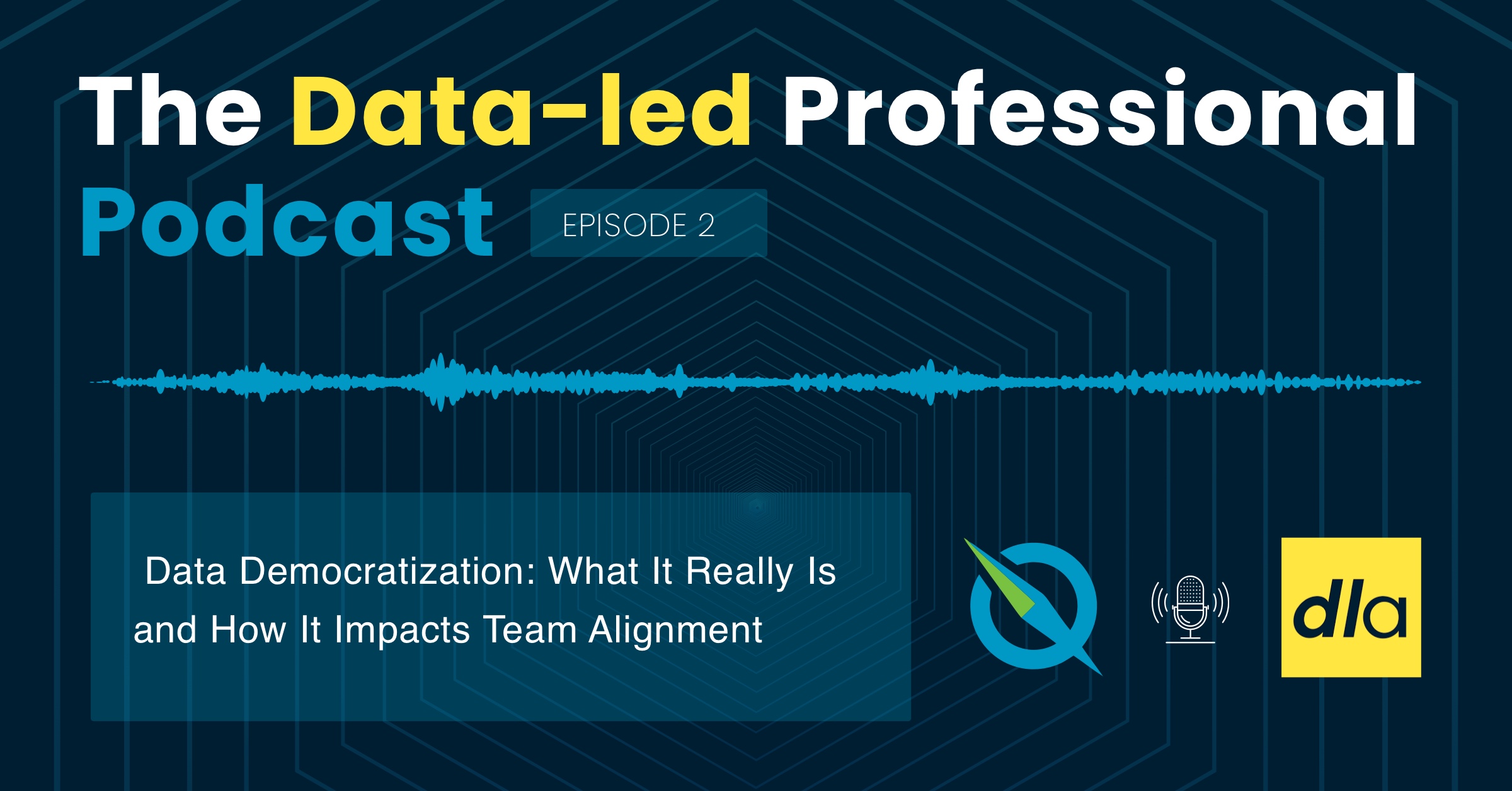In this week’s episode, join hosts Claudiu Murariu, CEO and Co-Founder of InnerTrends, and Arpit Choudhury, Founder of Data-led Academy, as they come together to discuss the utilization of Data Democratization across a company or organization to achieve uniform definitions of data, the role it plays within team alignment, and its impact on overall growth.
Welcome to The Data-led Professional Podcast: A podcast dedicated to helping folks become data-led to build better products and experiences.
Want to listen to the whole episode? Check it out here:
Subscribe for more episodes on your favorite platform:
Listen on Apple Podcasts Listen on Spotify Listen on Google Podcasts Listen on StitcherWhat does data democratization mean?
[A]: Data democratization refers to a situation where employees across an organization are able to get answers to their data-related questions quickly and easily, without jumping through a lot of hoops.
[C]: But we know that doesn’t really happen in a lot of companies. So if it’s an easy concept, why do you think it’s not happening?
[A]: I think a lot depends on the stage of a company, the market or industry they operate in and the kind of resources they have. This is a hard challenge, and it’s also a new challenge. The industry is nascent, and a lot of people are trying to solve this problem in different ways, but at the end of the day, there is no simple solution to this, and there is no one-size-fits-all rule.
People across different teams should be able get answers to their questions by themselves in a self-serving manner. And if that is not possible, they should be able to get answers to their questions quickly, and that can only happen when there is a proper process in place, and there is a team that owns all of the data that it’s generated or gathered at a company.
[C]: One reason why I believe this is difficult for many companies is that data is not easy to work with. You need skills to work with data. So data democratization is a simple concept, but just like in democracy, where you have different institutions, and every institution has its own role… it works the same way inside of a company.
So you need to know how to manage the skills, and you need to know how to work with the data in order to truly get to data democratization. And truth being said, most people inside a company are not really data literate. So this is probably one of the big challenges in data democratization.
I think many companies confuse data democratization with chaos, which is totally wrong. Data democratization means structure; so there is a lot of structure in place, which allows everyone to know what the process is for them to get to the answer that they need.
[A]: You mentioned something very important- data literacy. I don’t think everybody in an organization needs to know how to write SQL or how to operate BI tools (in the “classic way,” as BI tools should be user-friendly for business roles), but they need to be data literate. They need to understand what data is being generated, what data exists or doesn’t exist, and they should be able to ask the right questions. If you talk to people at larger companies, this is one of the biggest challenges they face. Other people aren’t asking the right questions, and a lot of time is wasted in the process of figuring out, what is the question? Because providing answers can be rather easy.
[C]: Which leads to another important aspect. You cannot have data democratization without data education. How do you get to a data democratization culture? And which team generally owns data operations and should educate the people inside the company?
[A]: I think that’s such an important question. It depends on the size of the company, the resources that they have.
But an interesting way to look at it is whether the data that a company owns affects their core product offering or not. If your core offering relies on the data that is generated, you obviously need to have a dedicated data team, which can be structured in many different ways. And there’s a lot of great content out there on how you should structure your data team.
In terms of size, larger companies definitely have a data team, mid-size companies may not have the resources or they’re still early in their data journey.
I’d like to touch on this new concept of a product operations team, a cross-functional team– made of data engineers, data analysts, product managers- which sits at the intersection of product data and marketing, and handles all of the data requests, and they own all of the data.
What is the impact of a tightly aligned team [around data] on an organization’s business goals?
[C]: It’s not about, again, going deep inside the data. The first thing a tightly aligned team needs to achieve is sharing the same definitions of the data. Having that has a huge impact on what’s going to happen next.
Often when I go into meetings with different companies, three different people in the same company would talk about the same thing; a conversion rate, for example. But every one of them would have their own definition. So you’d start to doubt, “Hey, who’s right here? What’s the right metric I should look at?” When in reality, they mean three different things. So I think the most important thing is to start with the definitions, and lining everyone up on those definitions. It’ll have a huge impact on an organization’s business goals.
[A]: From my experience, just defining an activated user versus an active user can be a mammoth task if you don’t have the right data definitions. There are a couple of great exercises that organizations can do to get these definitions right early on, where they bring everyone who is going to be impacted by the definitions together and give them a chance to define all of the different definitions they have in mind. It really depends on your business goals, your product, etc.
[C]:
Team alignment can start with a document. What we often recommend is an actionable metrics canvas. A single page with metrics around five pillars: acquisition, activation, revenue, referral, and retention, and for each metric, you define what it means, and what supporting metrics should be followed within that stage. Having that document will significantly change how your company operates. The whole company becomes aligned on that piece of paper, and you can print it and put it up on a wall, or have it in your data knowledge base.
[A]: And if individuals from different teams are well aligned, and they know what they should focus on, then you should be able to meet your business goals, right? Or if that’s not the case, if people are constantly trying to figure out, “Who owns activation? Or is this my responsibility?” If they have to keep debating who owns what, your business goals are obviously going to suffer.
[C]: So often companies go into a meeting and say, “What should our goal be?” This is the wrong way to do it. You should actually start with that document. That document tells you the goal! Once you have that actionable metrics canvas and you have all of the stages, and everything that should be monitored at those stages, the next thing you do is simply put the values in. If you just put the metrics on there, anyone in the company will be aligned with what your next goal is. You don’t need to define it, it’s right there in front of you.
Should every department use their own data tools? Or should the tools be standardized across the organization?
[C]: There are two ways companies deal with this question. The first way is: every department manages their own tools. And that leads to a lot of problems, even in spending. And companies think with data democratization, everyone is free to do whatever they want with their data, which I don’t agree with.
The other way of doing it is “we have this tool of data, every single department needs to use this, because we don’t want to have chaos in our data.”
Let’s say you hire a very good product manager. But they have experience with other tools; their first month within your company, they will need to adapt to your tools, which means they will not necessarily bring value to the company. And if they don’t adapt, they will just leave the company. I don’t believe in either of these models.
The third model, used by the most successful companies, is to have a single source of truth for the data. A warehouse where all of your data is placed, and it’s valid and accurate. It’s a raw data system that allows any department to link any tool they want back to it. So the data is unique. But the interface for analyzing the data depends on every single department out there.
[A]: I think that it should not be about this or that tool; if someone is really good, and they want to use other tools, they should be allowed to use those tools. But at the same time, we should keep ourselves afloat in the same way, and that can be achieved with a data warehouse, wherein you use the data warehouse as your source system to disseminate to all your external tools.
Today, warehouses have become really affordable. There is no excuse to not set one up, and have it in place. So tomorrow, if you decide to ditch a certain tool, your data remains secure. People will actually trust that data if the source is the same.
If your source systems are not standardized, and you have multiple sources, you spend so much time figuring out where the issue exists. And once you’ve figured it out, you don’t even know if it has been fully resolved. So having a single source, such as a data warehouse, definitely builds more trust, and it empowers more people.
[C]: So if I were to summarize our discussion, you need a source of truth and you also need somebody or- in bigger companies- a department who owns that data. But every single department should be able to have access to that data and use it as they wish.
[A]: Absolutely. Data democratization is the need of the hour and how you fix it depends on your priorities, but it’s something that needs fixing. It can impact everything that you do and even the kind of talent you can attract. So don’t take this topic lightly.
Have any additional questions about data democratization, or any topics you would like to hear covered on the The Data-Led Professional Podcast? Comment below! We can’t wait to hear from you.
Subscribe for more episodes on your favorite platform.
Listen on Apple Podcasts Listen on Spotify Listen on Google Podcasts Listen on Stitcher




